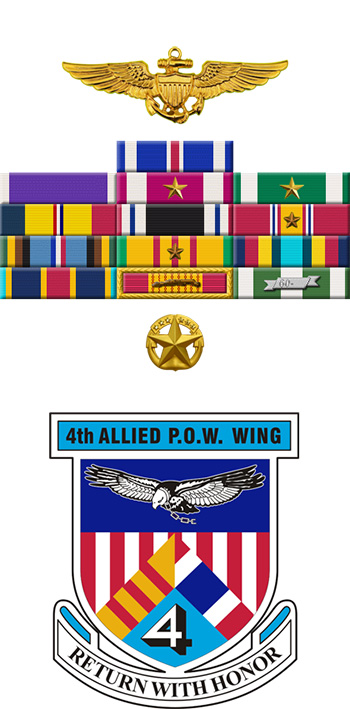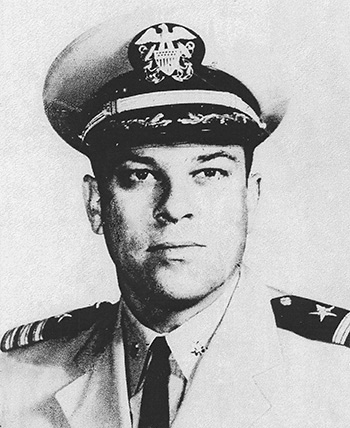
|
Charles F. "Chuck" Klusmann |
 |
|||
| Rank, Service | ||||
Captain O-6, U.S. Navy |
||||
| Veteran of: | ||||
|
||||
| Tribute: | ||||
Chuck Klusmann was born on September 7, 1933, in Indianapolis, Indiana. He enlisted in the U.S. Naval Reserve on February 23, 1952, and went on active duty in the Navy beginning March 18, 1953. After completing basic training at NTC San Diego, he attended Class A Aerographer's Mate School at NAS Lakehurst, New Jersey, followed by service as an Aerographer at Naval Ordnance Test Facility China Lake, California, until he was accepted into the Naval Aviation Cadet Program and began flight training at NAS Pensacola, Florida, in July 1954. He was commissioned an Ensign in the U.S. Navy and designated a Naval Aviator on July 26, 1955, and then served as an AD-6 Skyraider pilot with VA-215 at NAS Moffett Field, California, from August 1955 to March 1957. His next assignment was as an F9F Panther pilot and flight instructor with ATU-202 and ATU-222 at NAAS Kingsville, Texas, from April 1957 to July 1959, followed by General Line School at Monterey, California, from August 1959 to May 1960, and Catapult School at NAS Philadelphia, Pennsylvania, from June to August 1960. LT Klusmann served as Catapult Officer aboard the aircraft carrier USS Bon Homme Richard (CV-31) from September 1960 to October 1962, and then served as an RF-8 Crusader pilot with VFP-63 as NAS Miramar, California, from November 1962 to October 1963, and deployed aboard the aircraft carrier USS Kitty Hawk (CVA-63) from October 1963 until he was forced to eject over Laos and was taken as a Prisoner of War on June 6, 1964. After spending over 80 days in captivity he escaped from his captors and made it back to friendly forces on August 31, 1964. LT Klusmann then returned to the United States, and attended Naval Postgraduate School at Monterey, California, from December 1964 to October 1966, followed by service as a test pilot with Air Development Squadron 4 (VX-4) at NAS Point Mugu, California, from November 1966 to July 1968. CDR Klusmann attended Naval War College and then the Military Law and Procedure Course with the Navy Justice School at Navy War College, Newport, Rhode Island, from August 1968 to January 1969, and then served as Executive Officer and then Commanding Officer of VT-22 at NAS Kingsville, Texas, from July 1969 to September 1971. He next served as Flight Training Officer for the Chief of Naval Air Training at NAS Corpus Christi, Texas, from September 1971 to July 1973, followed by service as Air Boss and then Executive Officer aboard the aircraft carrier USS Lexington (CVT-16) from August 1973 to December 1976. CAPT Klusmann served Commanding Officer of the Fleet Coordinating Group, Western Pacific, at San Miguel in the Philippines from January 1977 to April 1979, and then as Deputy Chief of Staff for Mines on the staff of the Commander Mine Warfare Command at Charleston, South Carolina, from May 1979 until his retirement from the Navy on October 1, 1980. Chuck Klusmann Flew West on October 3, 2024, and was buried at Barrancas National Cemetery on NAS Pensacola, Florida. |
||||
|
||||

